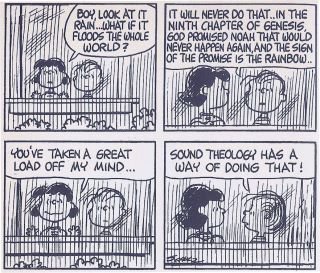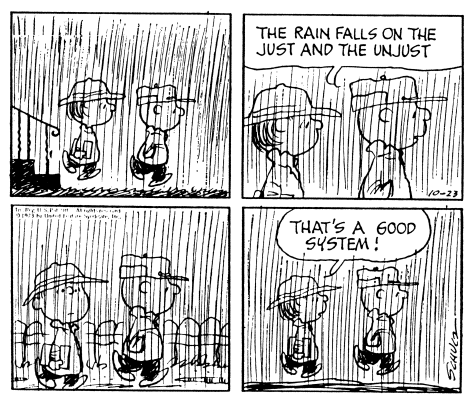you might be wrong

This week we were reading a book on the question ”Who needs theology? (by Stanley J. Grenz and Roger E. Olson). The authors are enfolding their answer to this question. ”Who needs theology? And their answer is quite simple:
“All do.” (p. 46)
So what is the book really about?
Grenz and Olson are presenting rather their own theological system (perhaps due to the short and elementary form) than an overview of different definitions, science historical approaches or and introduction to diverse theologians.
The explanations on the definition and the history of “theology” they are providing are very short. Illustrations on the differentiation of the theological disciplines are foreshortened and their explications on the relation of biblical and exegetical, hermeneutic and contextual and lastly a break down of theological concepts insufficient.
If I am not adequately introduced to
- what theology is, was and will be (and I would expect that, since the book is about theology);
- where theology came from
- who theology was explored and affected by
- what the bible says about it on a broad horizon of different hermeneutical approaches
… then I would rather not have anything to with it. Because then it stays dubious and suspicious to the reader.
So the (positive embrace to the question and) the answer about theology does not seem to be as easy as Grenz and Olson state.
Perhaps it is linked to the division of the different types of theologians and their differing practices and approaches of theology within five categories:
- folk theologian
- lay theologian
- ministerial theologian
- professional theologian
- academic theologian
Grenz and Olson are presenting this four approaches rather as idealized and goal-oriented stages than as descriptions of the average conditions in the real life of men and women in the churches.
Due to the stage oriented perspective the determination of Grenz’ and Olson’s determination is excluding and discriminative against all members of churches who didn’t or couldn’t join seminary.
For just as the body is one and has many members, and all the members of the body, though many, are one body, so it is with Christ.
1 Cor 12:12
Children theology
Grenz and Olson are using plenty of Charles M. Schulz’ Peanuts comic strips to illustrate their thoughts.
To me it is fascination that they are devaluing folk and lay theologians, but that they are using children and dogs to explain their theological thoughts.
I suggest to break that school of thought by looking at different, more appreciative and valuing perspective on non-academics.
Like kids:

Since about 20 years a lot of religious education scholars, developmental scholars and theologians in Germany are researching on children theology.
Children theology is theology originated by children.
Hartmut Rupp defines the relevance of children theology the following way:
“Children theology is the mastering of comprehensive competences. It trains aesthetic, hermeneutic, methodic, objective, communicative and social competences.
The goal of childern theology is that kids can articulate their own impressions, insights, questions, interpretations, images, evaluations and opinions about religious topics, which means their religiosity. This happens with a constant reflection of the biblical-christian faith.
I phrase the goal of the competence in children theology as the ability to articulate the own religiosity and to reflect on it with others.”
Gerhard Bütttner states too:
“Children theology is no theology for children it is a theology of the children. It is only important to interpret the children in the right way, corresponding to their context (Questions of creation, notions and images of God, interpretation of biblical texts).
Children theology is a hermeneutic of active acquirement and not an educational system. Children theology isn’t replacing religious education. Children have a right for their own theology and they have a right for for their own theology as a “first naiviteé”
(all quoted and translated from “Jahrbuch der Kindertheologie” and “Zeitschrift für Religionspädagogik. Kindertheologie”)

Grenz and Olson are self-confident and assured that everyone needs theology.
Why not including all, not depending on their academic background and their intellectual and reflective capacities?
I tell you the truth, unless you change and become like little children, you will never enter the kingdom of heaven.
Mt 18:3
Theology of the Peanuts
And as a side note let me conclude that Charles M. Schulz is providing us with such a rich treasure of theological thoughts in his peanuts cartoons. It contains all the big topoi of theological examination from sin to revelation and from doubt to love.
And by the way, the name “Snoopy” goes back to a norwegian term of endearment, a name that a mother would call her young child (snupi), why not listen to young children to what God is doing in their lives and learn from them?
More insight on the Theology of the peanuts by Richard Beck you’ll find here.
Leave a Reply
You must be logged in to post a comment.